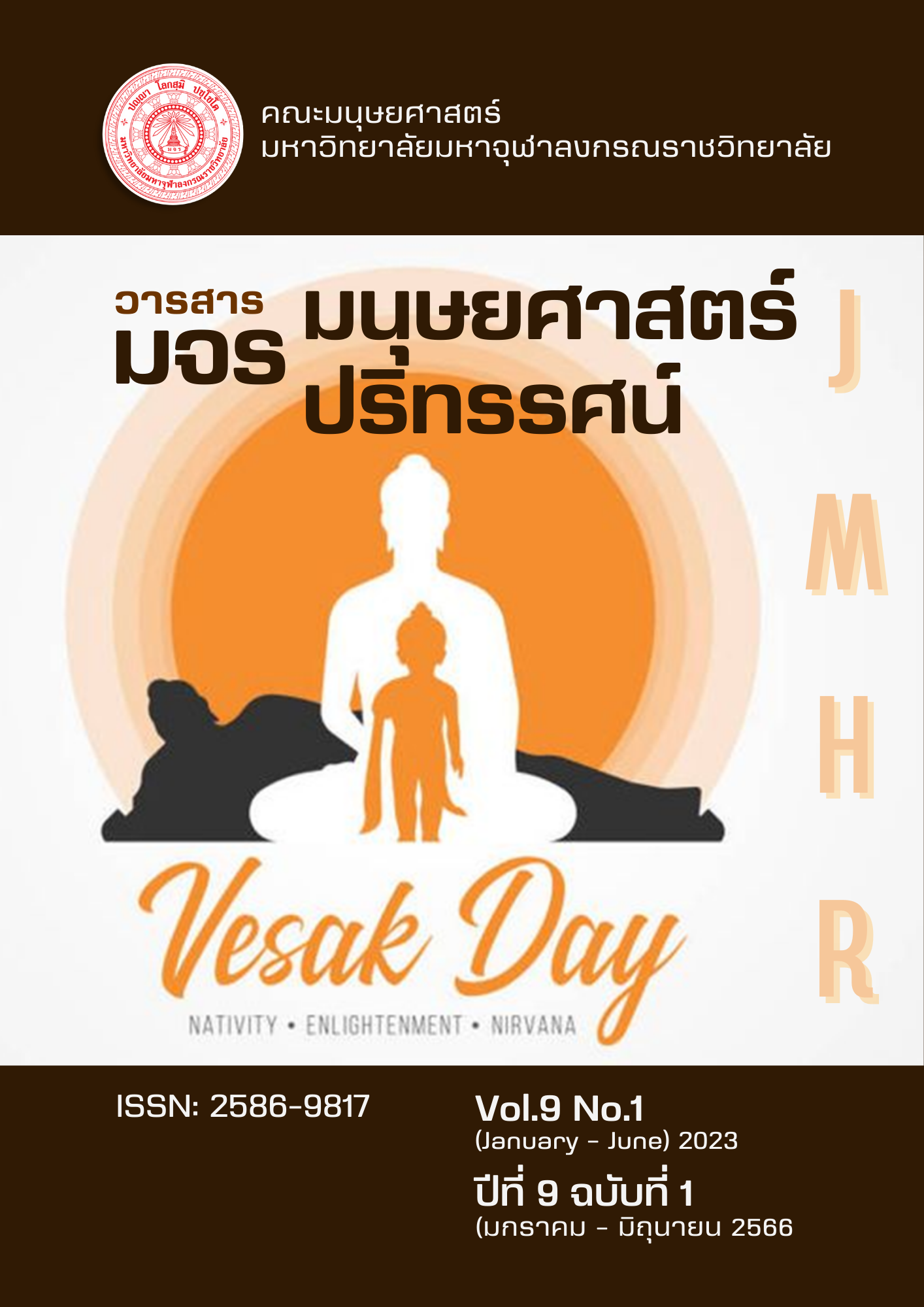การบูรณาการตามหลักพุทธธรรมเพื่อส่งเสริมภาวะผู้นำของคณะผู้บริหารองค์การบริหารส่วนตำบลบ้านพี้ อำเภอบ้านหลวง จังหวัดน่าน
คำสำคัญ:
ภาวะผู้นำ, พุทธธรรม, การบริหารงาน, การบูรณาการบทคัดย่อ
การวิจัยเรื่องนี้วัตถุประสงค์เพื่อศึกษา 1. ระดับภาวะผู้นำของคณะผู้บริหารองค์การบริหารส่วนตำบลบ้านพี้ 2. เปรียบเทียบความคิดเห็นของประชาชนต่อภาวะผู้นำของคณะผู้บริหารองค์การบริหารส่วนตำบลบ้านพี้ และ 3. เสนอแนวทางการบูรณาการหลักพุทธธรรมเพื่อส่งเสริมภาวะผู้นำของคณะผู้บริหารองค์การบริหารส่วนตำบลบ้านพี้ เป็นการวิจัยแบบผสานวิธี ระหว่างการวิจัยเชิงปริมาณ โดยใช้แบบสอบถามเก็บรวมรวมข้อมูลจากกลุ่มตัวอย่างจำนวน 336 คน วิเคราะห์ข้อมูลโดยใช้สถิติ คือ ค่าความถี่ ค่าร้อยละ ค่าเฉลี่ย ค่าส่วนเบี่ยงเบนมาตรฐาน และค่า t-test และ F-test เมื่อพบค่าที่แตกต่างกันจึงหาค่า LSD และการวิจัยเชิงคุณภาพ โดยใช้แบบสัมภาษณ์ เก็บข้อมูลกับผู้ให้ข้อมูลสำคัญ จำนวน 10 คน วิเคราะห์ข้อมูลด้วยการวิเคราะห์ข้อมูลเชิงพรรณานำเสนอตามวัตถุประสงค์การวิจัย
ผลการวิจัยพบว่า ระดับภาวะผู้นำของคณะผู้บริหารองค์การบริหารส่วนตำบลบ้านพี้ โดยภาพรวมอยู่ในระดับปานกลาง เมื่อพิจารณาเป็นรายด้าน พบว่า อยู่ในระดับปานกลางทุกด้าน ผลการเปรียบเทียบความคิดเห็นของประชาชนต่อภาวะผู้นำของคณะผู้บริหารองค์การบริหารส่วนตำบลบ้านพี้ โดยจำแนกตามปัจจัยส่วนบุคคลพบว่า ประชาชนที่มีเพศและรายได้แตกต่างกัน มีความคิดเห็นต่อภาวะผู้นำของคณะผู้บริหารองค์การบริหารส่วนตำบลบ้านพี้ แตกต่างกันอย่างมีนัยสำคัญทางสถิติ ที่ 0.01 ส่วนด้านอื่นไม่แตกต่างกันและแนวทางการบูรณาการหลักธรรมตามหลักพุทธธรรมเพื่อส่งเสริมภาวะผู้นำของคณะผู้บริหารองค์การบริหารส่วนตำบลบ้านพี้ คือ การบูรณาการด้วยหลักปาปนิกธรรม คือ จักขุมา วิธุโร นิสสยสัมปันโน และตัวแบบผู้นำ 4 ด้าน คือ ด้านทักษะ ด้านบุคลิกภาพ ด้านสังคมและด้านบทบาทหน้าที่
เอกสารอ้างอิง
ชัยเสฏฐ์ พรหมศรี. (2561). ภาวะผู้นำสำหรับผู้บริหารองค์การ : แนวคิดทฤษฎีและกรณีศึกษา. กรุงเทพฯ : ปัญญาชน.
พระทรงพล กิตฺติโก (สันประภา). (2560). การบริหารงานเพื่อพัฒนาสังคมขององค์บริหารส่วนตำบลทรายขาว อำเภอหัวไทร จังหวัดนครศรีธรรมราช (วิทยานิพนธ์พุทธศาสตรมหาบัณฑิต). มหาวิทยาลัยมหาจุฬาลงกรณราชวิทยาลัย. พระนครศรีอยุธยา.
พระปัญญา โชติธมฺโม (แก้วหาวงค์). (2561). ภาวะผู้นำตามหลักปาปณิกธรรมของผู้บริหารเทศบาลเมืองท่าเรือพระแท่น อำเภอท่ามะกา จังหวัดกาญจนบุรี (วิทยานิพนธ์รัฐประศาสนศาสตรมหาบัณฑิต). มหาวิทยาลัยมหาจุฬาลงกรณราชวิทยาลัย. พระนครศรีอยุธยา.
พระพรหมคุณาภรณ์(ป.อ. ปยุตฺโต). (2554). พจนานุกรมพุทธศาสตร์ (ฉบับประมวลธรรม). กรุงเทพฯ : สหธรรมมิก.
มหาวิทยาลัยมหาจุฬาลงกรณราชวิทยาลัย. (2539). พระไตรปิฎกภาษาไทย (ฉบับมหาจุฬาลงกรณราชวิทยาลัย). กรุงเทพฯ : โรงพิมพ์มหาจุฬาลงกรณราชวิทยาลัย.
รัตติกรณ์ จงวิศาล. (2559). ภาวะผู้นำ ทฤษฏีและแนวทางสู่การพัฒนา (พิมพ์ครั้งที่ 3). กรุงเทพฯ : โรงพิมพ์แห่งจุฬาลงกรณ์มหาวิทยาลัย.
สิทธิ์ธนัชท์ วารุณสหรัชภณ. (2559). การมีส่วนร่วมของประชาชนต่อการบริหารงานปกครองส่วนท้องถิ่น องค์การบริหารส่วนตำบลตลาดจินดา อำเภอสามพราน จังหวัดนครปฐม (วิทยานิพนธ์รัฐศาสตร์มหาบัณฑิต). กรุงเทพฯ : มหาวิทยาลัยธรรมศาสตร์.
สุรกิจ สุวรรณแกม. (2561). ภาวะผู้นำเชิงนวัตกรรมของผู้บริหารองค์กรปกครองส่วนท้องถิ่น ในอำเภอภาชี จังหวัดพระนครศรีอยุธยา (วิทยานิพนธ์รัฐประศาสนศาสตร์มหาบัณฑิต). มหาวิทยาลัยมหาจุฬาลงกรณ์ราชวิทยาลัย. พระนครศรีอยุธยา.
สุวิมล สังวร. (2561). การบริหารจัดการปัญหาอุทกภัยขององค์กรปกครองส่วนท้องถิ่นจังหวัดสิงห์บุรี (วิทยานิพนธ์รัฐประศาสนศาสตรมหาบัณฑิต). มหาวิทยาลัยมหาจุฬาลงกรณราชวิทยาลัย. พระนครศรีอยุธยา.
องค์การบริหารส่วนตำบลบ้านพี้. (2565). แผนพัฒนาท้องถิ่น (พ.ศ. 2561-2565). น่าน : องค์การบริหารส่วนตำบลบ้านพี้.
Phra Chamroeun Uttatechou Nuon. (2561). การประยุกต์ใช้หลักพุทธธรรมเพื่อการบริหารงานขององค์การบริหารส่วนตำบลบ้านโพธิ์ อำเภอเมือง จังหวัดนครราชสีมา (วิทยานิพนธ์รัฐประศาสนศาสตรมหาบัณฑิต). มหาวิทยาลัยมหาจุฬาลงกรณราชวิทยาลัย. พระนครศรีอยุธยา.
ดาวน์โหลด
เผยแพร่แล้ว
รูปแบบการอ้างอิง
ฉบับ
ประเภทบทความ
หมวดหมู่
สัญญาอนุญาต
ลิขสิทธิ์ (c) 2023 วารสาร มจร มนุษยศาสตร์ปริทรรศน์

อนุญาตภายใต้เงื่อนไข Creative Commons Attribution-NonCommercial-NoDerivatives 4.0 International License.






